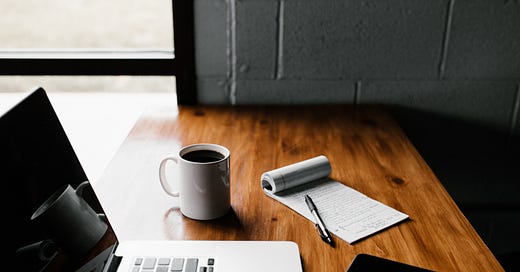How to beat procrastination pt. 4 - Single tasking
Why multitasking affects your productivity and what to do instead
In this day and age, we all work in fast-paced environments where we are required to tackle many projects simultaneously.
We don’t have enough time to get everything accomplished, so we turn to multitasking as a way to get everything done. We believe that multitasking makes us more effective, when in fact, it doesn’t.
I’ll share with you today why multitasking is a myth and negatively affects our productivity, and how it can incite you to procrastinate. Here we go.
Multitasking is a myth
When we multitask, we believe that we are working on many things at once.
But in fact, our brains are only able to focus on one thing at a time. We are not actually multitasking, we are task-switching.
There is a phenomenon that occurs when we leave one task to focus on the next that is called attention residue.
Indeed, research shows that it takes a few minutes for your brain to leave behind the thoughts associated with the previous tasks and focus properly on the next one. When you do this switch, you lose precious minutes of unaltered focus and productivity.
“Every time you switch from one task to another, you lose a little bit of time while your brain shifts gears, and all of this time adds up.” – Joel Garfinkle, author of Time Management Mastery
Why multitasking is affecting your productivity
Multitasking has many negative impacts on our work abilities. Here are a few :
Poor cognitive performance: according to a study at Ohio State University, task-switching affects our ability to think properly about the current task and affects our problem-solving capacities.
Increased stress levels: the frequent interruptions caused by task-switching create a feeling of urgency and can be the cause of chronic stress.
Loss of accuracy: multitaskers are prone to more errors, especially on more complex tasks and projects.
Decreases focus: it is almost impossible to focus properly when we are constantly switching back and forth, thus affecting our ability to immerse ourselves in the task at hand.
Decision fatigue: this subject deserves its own article, but basically, willpower is a finite resource. Each time you make a decision, you deplete your willpower. Switching from one task to the next quickly exhausts your willpower. Which in turn will lead to procrastination on other tasks.
Increases time required: multitasking impacts our work output, increasing the time required to complete a task by 25%, thus deeply affecting our productivity.
Negative impact on short-term memory: a study published in Proceedings of the National Academy of Science shows that multitasking students responded poorly to memory tests compared to non-multitasking students.
Reduces IQ by 10 points: according to a study by London’s King’s College, multitasking has a temporary negative impact on the intelligence quotient, 10 points can mean a lot as a knowledge worker!
Induces symptoms of ADHD: last but not least, physician and attention deficit disorder expert Edward Hallowell affirms that some multitaskers show symptoms of attention deficit disorder and hyperactivity.
I bet you are now convinced that multitasking is a real hindrance to your productivity!
All these negative impacts affect us cognitively but also physically, leading us to stress, burnout, procrastination, and unhappiness.
Hopefully, there is an easy way to get rid of those negative impacts.
What can you do instead?
Simple enough, the most effective solution to multitasking is… single-tasking. Do one thing at a time and fully focus.
You can use a Pomodoro timer to help you stay on task for a set period of time. Start small with a few minutes, and when your brain is used to focus on only one thing, increase the time you allow to do your task.
Another way to increase your focus is batch processing.
This process involves that you do all related tasks in a set block of time. For example, I batch all my accounting tasks on Monday mornings, that way I don’t lose time on attention residue since my brain is already in gear for accounting. Also, I batch my phone calls, emails, writing and research.
“I believe the ability to single-task (as opposed to multitasking) is one of the keys to true productivity” – Leo Babauta, author of zenhabits.net
Single-tasking reduces stress levels, increases your productivity and focus and might even increase your happiness! You’ll be less prone to procrastination and more efficient.
Want to give it a try?
Now up to you, are you a multitasker? Do you feel like multitasking is effective? Let us know in the comments below!



